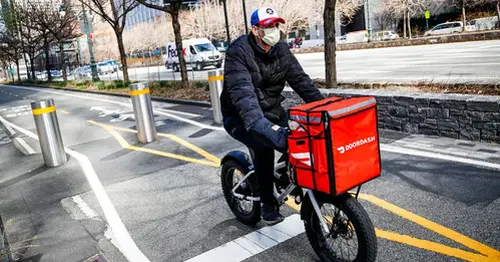
Uber, DoorDash and GrubHub lose attempt to block NYC delivery worker wage mandate
The popular delivery apps Uber, DoorDash and GrubHub on Thursday lost their bid to block New York City’s minimum wage mandate for app-based delivery workers.
Acting state Supreme Court Justice Nicholas Moyne ruled against the companies after they sued the city in July, when the rule was to go into effect. The decision will now make way for the minimum pay rate, which is scheduled to eventually reach $19.96 per hour, to be implemented for some 65,000 of the city’s delivery workers.
“Multi-billion dollar companies cannot profit off the backs of immigrant workers while paying them pennies in New York City and get away with it,” Ligia Guallpa, the director of the New York-based Workers Justice Project, which helped lead the advocacy efforts for a minimum wage, said in a statement. “The judge’s ruling is another reminder that workers will always win.”
Josh Gold, an Uber spokesman, said the mandate would harm couriers.
“The city continues to lie to workers and the public,” Gold said in a statement. “This law will put thousands of New Yorkers out of work and force the remaining couriers to compete against each other to deliver orders faster.”
A Grubhub spokesperson called the decision “disappointment, saying in a statement that the company is “evaluating our next legal steps.”
“We will now be forced to make changes to our platform that will have adverse consequences for delivery partners, consumers and independent businesses,” the spokesperson said. “We remain confident in our legal position and firmly believe that the City’s rule, while well-intentioned, is the result of a flawed rulemaking process that was not applied consistently to the food delivery industry.”
DoorDash did not respond to an NBC News’ request for comment. But the company called the decision in June by the city’s Department of Consumer and Worker Protection to raise the minimum wage “deeply misguided,” arguing that it would result in fewer opportunities for its delivery workers, price more customers out of orders and affect jobs at local restaurants.
The decision “ignores the unintended consequences it will cause and sadly will undermine the very delivery workers it seeks to support,” a spokesperson for the company said in a statement at the time.
For more from NBC Asian America, sign up for our weekly newsletter.
While Thursday’s ruling was a loss for the three companies, Relay — a smaller platform that had also sued the city but operates as a courier service for restaurants — was granted an injunction.
Moyne temporarily delayed the mandate in July as he considered the companies’ request. The three major apps had argued that the higher wage mandate would cause price hikes for consumers while simultaneously hurting delivery workers’ pay by causing the companies to track the time they spend on the apps without making deliveries.
Currently, some app-based delivery workers across the city rely primarily on tips to make their living, earning an average of $7.09 per hour. Because app-based delivery workers are considered independent contractors, they have traditionally been excluded from labor protections and exempt from minimum wage requirements.
The mandate announced in June would start minimum pay at $17.96 per hour, increasing to the $19.96 standard by April 2025.






